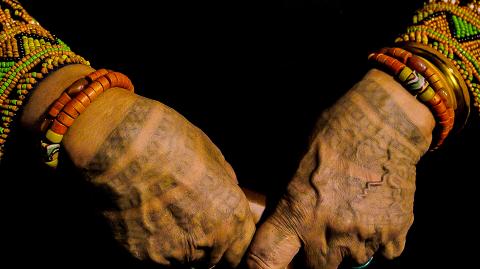Young Paiwan Aborigines from Pingtung County will take center stage at the National Concert Hall in Taipei tonight and tomorrow to perform Story of the Daughter of the Sun (太陽的女兒), the second musical program in the this year’s Taiwan International Festival of Arts.
The performers are students from the Taiwu Elementary School in Pingtung County’s Taiwu Township (泰武) who belong to the Taiwu Children’s Ancient Ballads Troupe (泰武古謠傳唱), as well as elders of the Puljetji community.
The troupe, which was founded in 2004 by Camake Valaule, a teacher at the school, specializes in traditional Paiwan songs. It has toured internationally and won a few Golden Melody Awards for its albums.

Photo courtesy of Tang Chien-che
Paiwan mythology says that the Paiwan are descendants of the sun. Traditionally, the Puljetji community’s leadership has been passed down to the eldest child of the leader, be it a boy or a girl, who is then known as the “son of the sun” or “daughter of the sun.”
Camake teamed up with theater director Wei Ying-chuan (魏瑛娟), the founder of the Shakespeare’s Wild Sisters (莎的劇團) troupe; film director Chen Hung-i (陳宏一) and installation artist Wang Te-yu (王德瑜) to create a multi-media production that tells the life story of the “Daughter of the Sun” through a mix of songs, traditional rituals and modern imagery.
The show runs 85 minutes without intermission, and the Concert Hall has warned that latecomers will not be admitted. There will be Chinese subtitles for the songs.
■ Tonight and tomorrow at the National Concert Hall (國家音樂廳), 21-1 Zhongshan S Rd, Taipei City (台北市中山南路21-1號)
■ Tickets are NT$700 to NT$2,000; available through NTCH ticketing, online at www.artsticket.com.tw and convenience store ticketing kiosk. Tomorrow night’s show is sold out.

Jan. 26 to Feb. 1 Nearly 90 years after it was last recorded, the Basay language was taught in a classroom for the first time in September last year. Over the following three months, students learned its sounds along with the customs and folktales of the Ketagalan people, who once spoke it across northern Taiwan. Although each Ketagalan settlement had its own language, Basay functioned as a common trade language. By the late 19th century, it had largely fallen out of daily use as speakers shifted to Hoklo (commonly known as Taiwanese), surviving only in fragments remembered by the elderly. In

William Liu (劉家君) moved to Kaohsiung from Nantou to live with his boyfriend Reg Hong (洪嘉佑). “In Nantou, people do not support gay rights at all and never even talk about it. Living here made me optimistic and made me realize how much I can express myself,” Liu tells the Taipei Times. Hong and his friend Cony Hsieh (謝昀希) are both active in several LGBT groups and organizations in Kaohsiung. They were among the people behind the city’s 16th Pride event in November last year, which gathered over 35,000 people. Along with others, they clearly see Kaohsiung as the nexus of LGBT rights.

Dissident artist Ai Weiwei’s (艾未未) famous return to the People’s Republic of China (PRC) has been overshadowed by the astonishing news of the latest arrests of senior military figures for “corruption,” but it is an interesting piece of news in its own right, though more for what Ai does not understand than for what he does. Ai simply lacks the reflective understanding that the loneliness and isolation he imagines are “European” are simply the joys of life as an expat. That goes both ways: “I love Taiwan!” say many still wet-behind-the-ears expats here, not realizing what they love is being an

In the American west, “it is said, water flows upwards towards money,” wrote Marc Reisner in one of the most compelling books on public policy ever written, Cadillac Desert. As Americans failed to overcome the West’s water scarcity with hard work and private capital, the Federal government came to the rescue. As Reisner describes: “the American West quietly became the first and most durable example of the modern welfare state.” In Taiwan, the money toward which water flows upwards is the high tech industry, particularly the chip powerhouse Taiwan Semiconductor Manufacturing Co (TSMC, 台積電). Typically articles on TSMC’s water demand